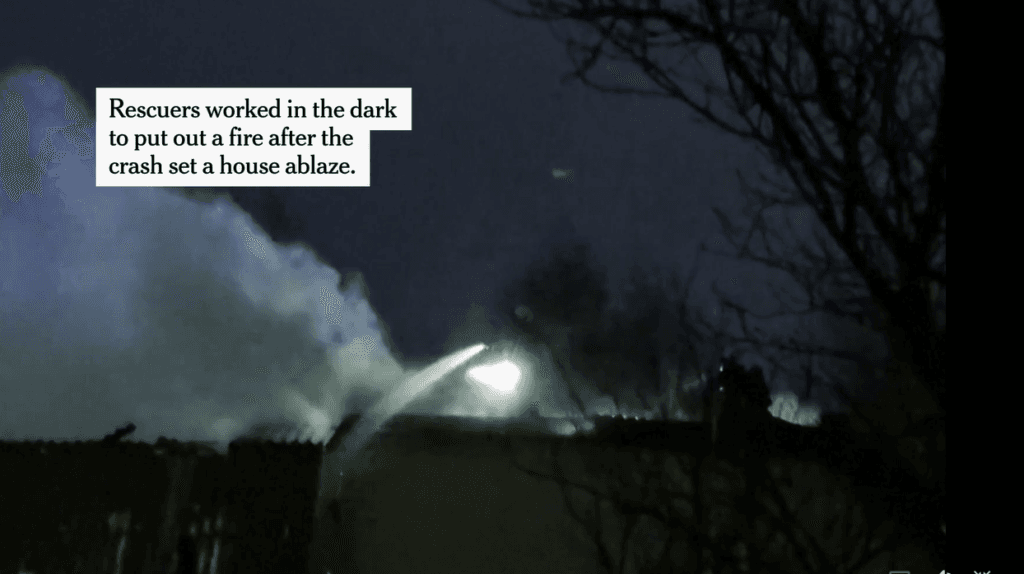
A DHL cargo plane operated by Swiftair on behalf of the global logistics company crashed into a residential house near Vilnius airport, Lithuania, early on [insert date], leaving one crew member dead and three others injured. The accident has drawn attention due to ongoing concerns about incendiary devices on western-bound cargo planes, though authorities have not yet established a link between the crash and these incidents.
DHL CARGO Crash Details

The Boeing 737-400 aircraft had departed from Leipzig, Germany, and was making its approach to Vilnius in overcast conditions when the crash occurred at approximately 03:30 GMT. The aircraft struck the ground and slid over 100 meters before colliding with a house in a residential neighborhood, igniting a fire. Fortunately, no local residents were killed, though 12 people were evacuated from the impacted property.
Prime Minister Ingrida Šimonytė commended the efforts of rescue services and emphasized the importance of awaiting official findings. “The responsible agencies are working diligently,” she stated. “Speculation won’t uncover the truth; only thorough investigation will.”
Firefighters battled flames at the site until dawn, while streets in the vicinity of the dhl cargo crash were cordoned off to ensure safety.
Casualties and Immediate Response OF the DHL Cargo

The dhl cargo accident claimed the life of a Spanish crew member. Three other crew members, hailing from Spain, Germany, and Lithuania, were injured and have been hospitalized. The swift response from rescue teams and local authorities helped prevent further casualties in the densely populated area.
Witnesses described a scene of chaos. “We were woken by the sound of an explosion,” said Stanislovas Jakimavicius, a resident living 300 meters away. “Through the window, we saw explosions and a cloud of fire. It was like fireworks.”
Investigation Underway
Lithuanian officials are leading the investigation into the crash, with assistance from German authorities. Preliminary findings have not suggested sabotage or terrorism, but the investigation remains ongoing. Lithuanian Defense Minister Laurynas Kasčiūnas stated, “So far, there are no signs or evidence suggesting sabotage or a terrorist act.”
Police and aviation experts are considering several potential causes, including technical failure and human error. Investigators have also noted that no explosion occurred before the crash, contradicting initial fears of an onboard incendiary device.
Germany, which has faced its own challenges with incendiary devices disguised as parcels earlier this year, is conducting a parallel inquiry. German officials remain in close contact with Lithuanian authorities as they investigate possible connections between this crash and earlier incidents involving fires in DHL warehouses.
Context: Suspicious Parcels and Incendiary Devices
Lithuania and neighboring Poland have recently reported cases of incendiary devices being sent on western-bound DHL cargo flights. Some of these devices, cleverly concealed in ordinary items like electric massagers, caused significant damage, including a lorry fire near Warsaw. These events have raised concerns about potential sabotage or terrorism, though Moscow has denied involvement in such acts.
The crash comes amid heightened vigilance in the region. Both Lithuania and Poland are NATO members and strong allies of Ukraine. As geopolitical tensions remain high, speculation about Russian-inspired sabotage has emerged, but investigators have yet to confirm any links.
Impact on Air Traffic and DHL Operations
The dh cargo crash disrupted operations at Vilnius airport, causing delays and at least one flight diversion to Riga. DHL, a global leader in logistics, has not yet commented on the crash or its implications for ongoing investigations into incendiary devices. Swiftair, the Madrid-based contractor operating the flight, has also remained silent as investigations continue.
Government and Public Reactions
The Lithuanian government has urged patience as investigators piece together the sequence of events leading to the crash. Counterintelligence chief Darius Jauniškis acknowledged that terrorism could not be entirely ruled out but stressed that no definitive evidence points in that direction.
Residents near the crash site are grappling with shock and loss. Local leaders have praised emergency responders for their swift action, which prevented further tragedy.
Broader Implications
This incident underscores the complexities of modern aviation security in a geopolitically tense environment. The investigation’s outcome could have significant ramifications for cargo shipping protocols, particularly in regions prone to sabotage fears.
Authorities across Europe are closely watching developments, with British counterterrorism police investigating potential links between this crash and earlier incidents involving warehouse fires. These investigations will likely influence policy decisions aimed at bolstering cargo flight security.
Conclusion
As Lithuania and Germany collaborate on uncovering the truth behind the crash, the focus remains on ensuring public safety and addressing any vulnerabilities in the cargo shipping process. While questions about incendiary devices linger, officials are committed to conducting thorough investigations free from speculation, offering a clearer understanding of the tragic events near Vilnius.
The aviation world now waits for definitive answers, as this tragedy brings renewed attention to the challenges of securing air cargo and preventing further incidents.


